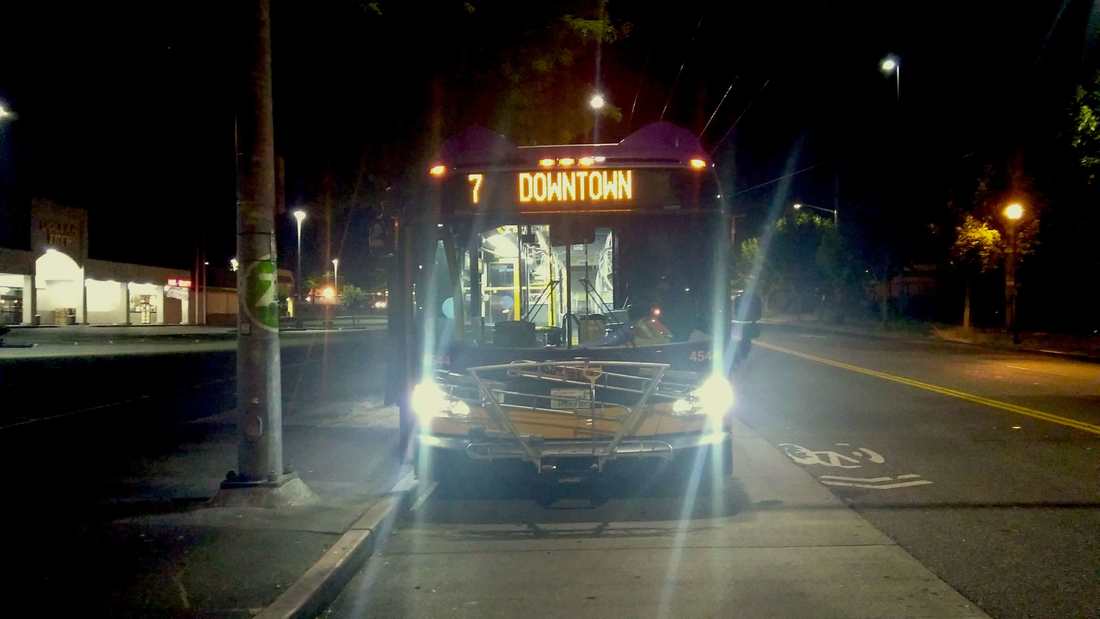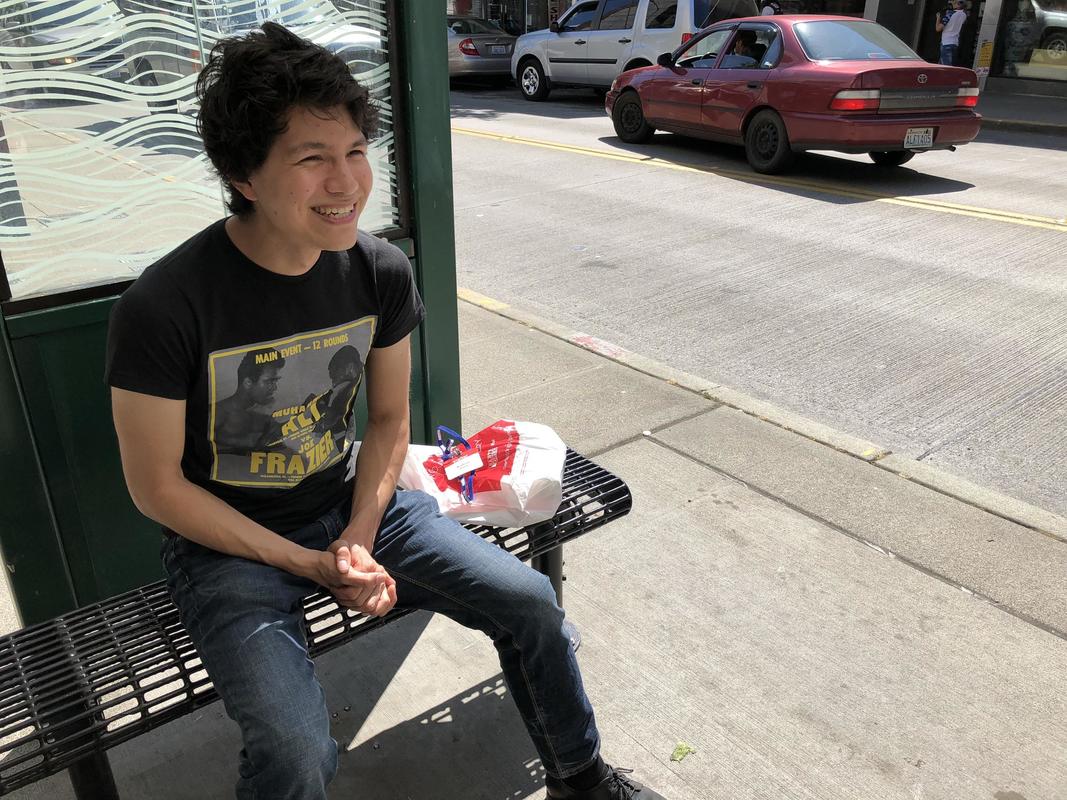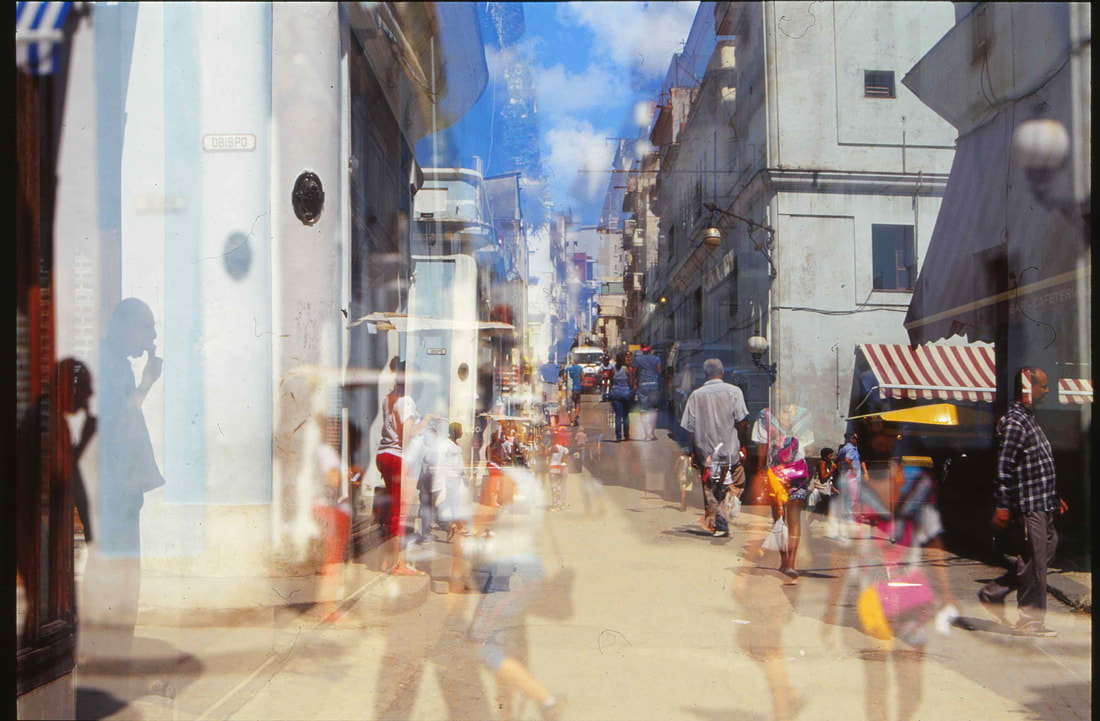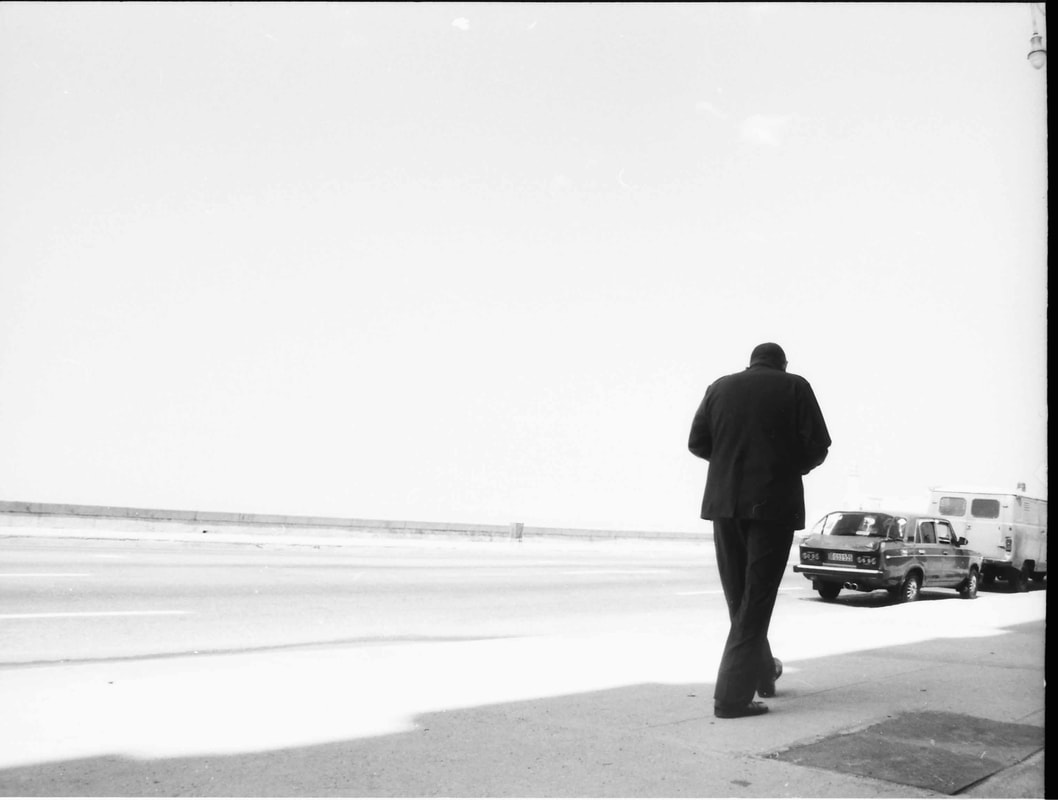|
Merriam-Webster defines roar as "to utter or emit a full loud prolonged sound" or "to sing or shout with full force."
You better believe it. I recognized his face and got excited. It was time for a volume adjustment– lots of roaring for him, and lots of listening by me. I was on the point of calling out his name when he beat me to the chase, bellowing: "WHY LING! WHY LING!" So that's how you say it. I've been saying Weyling for years. Was he a soothsayer? Did he know I was about to mispronounce his name for the umpteenth time? Without another word– or roar, I should perhaps say– he marched to the center of the bus. The nighttime silence began to envelope us again, slowly, returning us to the norm of what 11 P.M. is supposed to sound like. Dead of night. The whirr of the electric motor, the intermittent blast of the heater. From the sparsely populated interior came the deafening pronouncement: "HOW WAS YOUR DAY, BUS DRIVER?" Mr. Why Ling makes me quiet. Sometimes I like to match the volume of boisterous passengers, but his stentorian decrees are on another level entirely. You can't hope to match it. Why bother? I feel duty bound to balance him out with meek, reasonable-sounding and completely ordinary sentences, like: "Oh, pretty good. How 'bout you, are you headed home?" “A GREAT PLACE TO GO TO," he screamed, with warlike enthusiasm, as though I'd just suggested something illegal. "You got that right," I said. We work well together. With his glass-splitting howls and my innocuous volume working in counterpoint, we just about add up to a normal conversation. Almost. "I JUST PAID MY RENT FOR FEBRUARY. COME MARCH, I’M GONNA PAY IT AGAIN." I didn't know it was possible to combine equal parts gleefulness, belligerence, and gratitude into one tone of voice, but he managed it with aplomb. I've said it before: there's a quality of the child in Why Ling, an innocence behind the volume, which I quite enjoy. "GUESS WHAT I DID TODAY?" Why Ling makes the ordinary elemental. He describes normalcy with the magnified gravel of a new firmament, elevating us to the plane of larger-than-life. When you hear someone saying "I went to the waterfront today" at a level that almost makes you want to cover your ears... well, let's just say it's better than the movies. "Oh, cool," I exclaimed. "Was it nice?" "YES." "Was it cold?" "COLD?" He roared slowly, rhetorically. Rhetorical roaring is hard. Try it sometime. "THIS ISN'T COLD. YOU WANT COLD?" "I suppose-" "ANCHORAGE, ALASKA," he boomed, a benevolent general discovering a new planet and naming it for the first time. "THAT'S COLD." "I bet it is!" What a perfect pair we are. My quiet comments, intended for an audience of one, and his pronouncements, designed for an cast of thousands. "HAVE YOU BEEN THERE?" "I have not. Have you?" This could almost be ordinary conversation. But a rubber duck isn't a rubber duck anymore when it's six stories tall. His voice wasn't a voice: it was a three-dimensional living thing, an entity that used its vessel to express itself, rather than the other way around. "I RECOMMEND GOING THERE IN THE SUMMER MORE THAN THE WINTER!" He laughed maniacally, perhaps imagining the mayhem of subzero temperatures, cackling as though his comment had an obvious and irresistible double entendre. "THE SUMMER OVER THE WINTER!" "THEY'RE TOUGH UP THERE," he said, almost reflectively- but not quite. You can't be reflective when you're shattering glass. "I bet they are." "IF THEY GET THE COMMON COLD, THEY STILL BUCK UP AND GO TO WORK. THEY STOCK UP ON CHICKEN NOODLE SOUP." Chiiicken noooodle soooup. He stretched it out, giving each syllable its proper time in the sun. He made it an art piece no less than Warhol, but with a grit, a truth, an innocence, and a complete lack of pretense Warhol could never hope to touch. It's nice to be cultured, but there become certain things you can't see anymore. Why Ling reminded me of the power of simplicity, of basic truths. His admiration for hard work was uncomplicated, rooted in that rare and essential ability to have appreciation for that which is ordinary. Biting the cold and putting good work in, on plain food– that was something to admire. And with that, he abruptly got up and raced to the back, leaping out the open back door. But I had learned the night’s lesson of sorts, just in time. --- All your favorite Why Ling stories in one convenient place: -I've Been Sainted -In Supplication -The Benevolent Roar
0 Comments
Did you miss my interview on KUOW 94.9? No worries! Here is the full seventeen-minute interview! Hope you enjoy!
A note for Community Transit and First Transit operators– I love you! You know I'm poking fun here in loving jest only. You're just as capable as the best of them, and you'll always get a wave from me, no matter what agency you work for. We're all in this together. A warm thank you to the great Ross Reynolds, Adwoa Gyimah-Brempong and Bond Huberman... and all you lovely listeners. See you on the road! The sensation was that of riding on air, a wave of euphoria whose origin I could hardly trace.
I told them about the reroute. This was going to be exciting– if for no one else than at least myself, what with the pleasant diversion of driving a nine-foot wide, sixty-foot long articulated coach on new streets. Almost immediately a young woman bounced up and asked furtively, politely, "I know this isn't a bus stop but is there any chance, possibly, maybe, that you could, just for today...." "Sure," I replied with a smile. "Quick, before, anyone sees!" Her normal stop was twenty-seven blocks away. Look at that smile. Was she cute? Of course she was. Everybody's cute, when they're in the mood she was in. I caught up to the bus scheduled just before me (my "leader," in bus parlance), who'd neglected the reroute and was now paying the price in lost time. He was busy and crowded; we ambled along behind, hardly working and half empty, looking for people to pick up to make his job easier. Bus-savvy passengers know the second bus of two is always the preferred choice, and half the time ends up in the lead anyway. There's room to sprawl out in here. As I parked behind my leader at the transit center, my relief driver ambled over with a smile, understanding the situation at a glance. I explained the brilliance of the reroute to him, and we talked about turns and clearances and express lanes. Don't you love how work jargon rolls right off the tongue? Bruce. He and I are birds of a feather. I gestured to another passenger onboard, motioning the half-lost middle-aged mother to come forward and fret not, it's okay now, Bruce the friendly bus driver is taking over and all is well again. I identified her to Bruce as "the wonderful young lady up front," and she laughed, maybe because she needed to: she was on her way to comfort a sick sibling, had flown in from out of town to do so. Ah, family. I gave Bruce the bus and walked away with a smile, listening to their two voices merging. Driving the base car back to the base to clock out, sitting in slow but moving traffic, moving faster now, with the radio tuned to friendly voices, interviews and laughter. The swishing wipers offer a backbeat, the drum rhythm of city life. I dashed into the base, signing my name out and returning the base car. The window man asked if I was coming back for my second shift later on. "In a few hours," I replied, quipping, "I'm gonna go home and think about it for a while!" "Do you know Nathan?" he asked a nearby supervisor. "Do I know Nathan? Of course I know Nathan! Filmmaker, blogger, bus driver photographer extraordinaire..." "Oh gosh, you guys," I said. The other continued, "but have you met Nathan? There's knowing and there's meeting. I know who the president is..." "Oh no, don't compare me to that guy! We're two different people, I swear!" I jogged back out into the pouring parking lot, excited to rush home for a few hours, enough time to cook a meal, work on my film, write this draft, and who knows– maybe even relax for a second. I leapt over the water puddles toward my car, calling out to another colleague, "wonderful weather we're having!" "Um, yeah," she cried, shaking her head. "I love swimholes!!" The metaphor of a pot reaching a boil isn't generally used to describe the sensation of such mundane tasks, but isn't that exactly what the most worthwhile, most deeply earned bliss feels like? These were the moments in between, that by rights should barely register in the raising of our mood, if we're to believe what we're told... who knew these things could make my day? Running to my car in the rain, reroutes and road reliefs? There is a type of well-being that floods one's system almost surreptitiously. It is the slow accumulation of interactions in which we feel whole, accepted– loved not by our loved ones but by everyone, included in the fabric of the world at large, the embrace that tells us it's okay to be who we are. It seems to come from nowhere, but it’s a torrent coursing through your veins. Belonging. Oddly, the effect is strongest in interactions with people we barely know. We already know our small network of family and friends loves us. This is the world, speaking through the language of the ordinary, telling you your family is the entire population. When you're nice to a stranger, you may be helping them toward that sensation, building a block, offering one of a series of moments that infuses them with that unspeakably beautiful feeling of acceptance. I've said it before (in the post below, ha!), and I'll say it again– the positive impact you have on others will always be larger than you're aware. ---- In the spirit of this story, I'm compelled to add to the compilation post for new operators another story, written after the death of Eric Garner, that explores the meaning behind these lil' interactions and how effortlessly they teach goodness to others during these bizarre and troubled times. "Man, she, she was always worried something like this might happen. That's why I been the way I am. For them, just in case she needed me. Just in case it came to this. I stayed out of trouble with the law, never been arrested or charged with anything my whole life. I didn't get involved. Never got married, never had kids, 'cause the financial burden. Din't want to get caught up in any of that, just in case for her. My friends they would always be all like, man, why you don't hang? They be laughin', makin' their fun.... They get it now. They done stopped laughin' now."
He rode my evening 7 for months before we began striking up a rapport. Hesitant nods and eyes at first, intermittent, him with his big headphones and quiet eyes, a contrast to his built physique. He was a bouncer, going in for the evening shift. The 7 before mine would drive by, but he preferred my ship, the easy sense of calm and camaraderie I'm told floats through my bus. I'd spy him sitting in the back, always the back corner, big book in hand. We'd gotten to exchanging a few words at the start of a ride or parked outside at the terminal, before he strode back there– "to get my read on." Even if it's in the silences, you get to know certain people as the seasons turn over. I knew enough of him, knew him long enough, to feel the gut sucker punch of his tragedy when he told me. One night I was hearing how his father wasn't doing too well... and now here we are, too soon, two men lost under a streetlight, wondering why the waves of the ocean have stopped moving. "These are the days of after," Don Delillo wrote. "Everything now is measured by after." Michael. That was his name. Mike. His sorrow had the shape of rueful understanding, in the will of his preparation. Those are his words above, elucidating certain of his life choices; because a mother can only take care of her ailing husband for so long, can only be helped by him when he's alive and able. Can only be held up from collapse by love. They done stopped laughing now. Who takes care of the caretaker? Michael will. |
Nathan
Archives
July 2024
Categories |




 RSS Feed
RSS Feed
